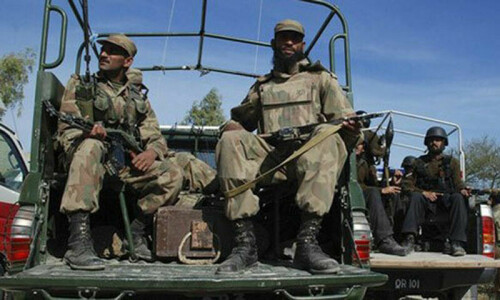PESHAWAR, Feb 21: Drinking water in the districts of Peshawar, Mardan and Mingora is unsafe for human consumption due to bacterial contamination, report of a survey conducted by the Pakistan Council of Research and Water Resources (PCRWR) has found.
In the absence of a permanent water quality-monitoring network, polluted water had become a serious problem and most of reported health problems are directly or indirectly related to drinking water, the report said.
Considering the deteriorating water quality, the PCRWR launched a national programme for monitoring the water in Pakistan about two years ago to observe changes in surface and ground water quality and take remedial measures to improve quality and sustainable use of water resources.
Under the project, samples of drinking water were taken from 21 cities, including 11 samples from Punjab, 3 from Sindh, 4 from Balochistan and 3 from the NWFP. The sources of water samples were tap, tube-wells, wells, hand-pumps, springs, reservoirs, rivers and lakes.
Overall, the water samples of cities including Peshawar were found bacterially contaminated. Almost 50 per cent of the samples from 17 cities were found unfit for human consumption.
All samples from Gujrat, Khuzdar, Loralai and Ziarat were found bacterially contaminated and unsafe for use, the survey findings revealed. As decontamination facilities were generally not present in most of the cities, the water was unsafe for human consumption, the PCRWR report said.
The overall deterioration in the quality of groundwater may also be associated with continuous drop in the water table in addition to industrial and agricultural activities. It was also observed that in most of the cities the water table was falling from one to 10 feet every year.
The drinking and irrigation water of three cities of the NWFP - Mardan, Peshawar and Mingora, were also found polluted, PCRWR report said. A WHO survey said that each year one hundred million cases of diarrhoea were registered for treatment in hospitals in Pakistan.
Water-borne diseases such as cholera, typhoid, dysentery, hepatitis, giardiasis, cry ptosporidiosis and guinea worm infections and diseases due to sanitation problems were most probably the result the polluted water, a WHO official based in Peshawar said.
"During WHO investigations, the drinking water of Peshawar was found contaminated and not safe for consumption," Dr Quaid Saeed, a WHO's Peshawar-based Emergency Medical Officer, told Dawn.
Results of various investigations and surveys indicate that the water pollution has increased in Pakistan. The pollution levels are higher in cities particularly where cluster of industries have been established.
The water quality deterioration problems as detected by the PCRWR in Jehlum, Chenab, Ravi, Sutlaj, Indus and Kabul rivers during the survey were caused by discharge of toxic organic chemicals, untreated sewerage, solid wastes into these rivers.
"All the toxic waste produced by the Hayatabad Industrial units gets mixed up in the river Kabul ultimately which has caused pollution of river. All units are working without a waste water treatment plants, said an environmentalist at the PCSIR, Peshawar observed.
The PCRWR report also says that River Kabul, at Nowshera, has high coliform content, suspended solids, high biological oxygen demand and low dissolved oxygen. All the other rivers were also found contaminated with industrial wastes. Due to industrial discharge of Punjab and Sindh, the contents of heavy metals have been found in the River Indus.












































Dear visitor, the comments section is undergoing an overhaul and will return soon.